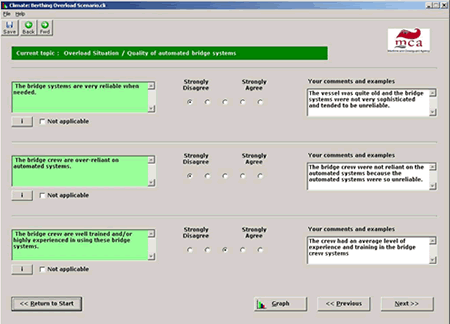CLIMATE
Overview of CLIMATE
How CLIMATE can be used
What to consider when using CLIMATE
What to do with the results
CLIMATE stands for the Cognitive Loading Index for Mariners Assessment TEchnique.
CLIMATE has been developed by Human Reliability
Associates on behalf of the Maritime and Coastguard Agency (MCA)
in response to a trend in incidents and accidents resulting from inappropriate
cognitive workload.
CLIMATE will soon be available for use from the MCA.
How CLIMATE can be
used
CLIMATE has been developed to help make informed decisions based on the
likely risks associated with an overload or underload scenario. It allows
the factors which affect workload to be assessed in a standardised and
systematic manner. It can be applied to an entire voyage or to a single
point in time during a passage. The process produces an index of underload
or overload, which is known as the ‘Cognitive Loading Index’
(CLI). The CLI indicates whether the mental workload required by the scenario
in question is likely to be at a safe level, or whether an incident or
accident is likely to occur due to overload or underload.
Back to the top
What to consider
when using CLIMATE
Because the factors affecting overload and underload are not always the
same, the first step when using CLIMATE is to select the overload or underload
model for the program to use. This is easiest when experience suggests
which end of the scale is most likely to apply to the scenario in question.
However, if the user is unsure which model to use, running the scenario
through both models will indicate whether the situation is an overload
or underload situation, or indeed whether loading is an issue at all in
this scenario.
Whilst a full voyage can be assessed, considering a particular point
during the voyage is likely to give a more focused result, especially
as longer periods of time are more likely to involve both overload and
underload conditions.

Back to the top
What to do
with the results
Completing a CLIMATE assessment will produce a cognitive loading index
for the scenario being considered, based on the ratings given by the user
for the relevant factors. If the assessment indicates that the workload
is at an unsafe level, the tool can be used to show the factors that led
to this outcome. These can be displayed in order of influence on the CLI
to show which might be focused on to restore the CLI to a safer level.
However, the cost or timescale involved in altering some factors will
be higher than others, and indeed some factors, such as the weather, will
be outside the control of the ship’s complement or the shipping
company ashore. CLIMATE provides a ‘what-if’ analysis option
to evaluate the effects of changing different factors on the overall CLI.
It is therefore intended to provide an advisory input to complement the
decision making of key stakeholders such as masters and shore-based managers.
Different scenarios can be compared in a graphical and a numerical format,
for instance for different points in the same voyage or for different
vessels in a fleet.
Back to the top
|